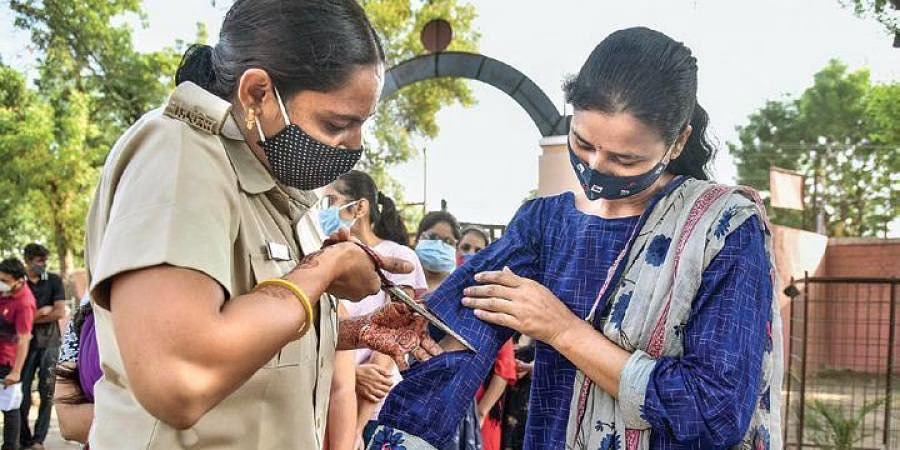Cutting Sleeves, Making Women Remove Bra During Exams Is Wrong. Period.
Guard cuts woman’s sleeves: Authorities were seen cutting sleeves of women candidates’ outfits for the Rajasthan Administrative Services as a strict measure against cheating. The National Commission of Women Chairperson Rekha Sharma wrote to the Chief Secretary of the Government of Rajasthan, condemning the incident and demanding strict action against the security guard.
The incident took place outside the examination centre at Bikaner in Rajasthan. A male security guard was photographed cutting the sleeves of the candidates as a measure to avoid cheating. In the view of the malpractice during the examination of the Rajasthan Eligibility Examination For Teachers (REET).
The NCW Chairperson Sharma has also sought an explanation as to why was there no female security guard to search the candidates at the centre. According to media reports, men wearing full sleeve shirts were asked to sit for examination shirtless.
However absurd the entire case and the argument of ‘strictness’ may sound, this is not new in India and just a simple google search on similar incidents can widen one’s eyes with shock.
A similar case of whipping out the scissors to cut off the sleeves, because apparently, that is the only place chits can be hidden, was in the 2017 National Eligibility cum Entrance Test (NEET) examination. The ridiculous dos and don’ts list for the examination mentioned: no bras, no full-sleeved tops or shirts, leave the footwear out of the exam hall.
The NCW said it has come across an outrageous media post wherein a male security guard can be seen cutting the sleeves of a top worn by a female candidate and has also sought an explanation why no female guard was deputed for checking the women candidates.
“How can they cut the clothes of girls in the name of controlling cheating? This is atrocious. @ashokgehlot51 you must stop this,” tweeted Sharma.
She strongly objected to the incident reported from an exam centre in Bikaner district on Wednesday.
To counter cheating, the Rajasthan government had issued a list of dos and don’ts. Female candidates were instructed not to wear sleeved clothes while appearing for the exam.
The government had also suspended mobile internet, bulk SMS and access to social media services in many districts.
Paper leaks and cheating rackets have been a huge headache for the state government.
Over the past year, such incidents have rocked five major competitive exams, including the test to recruit SIs, NEET, JEN, librarians and REET.
Right to dignity
“It is utterly humiliating to make women go through such harassment and NCW strongly condemns the shameful incident,” the NCW said.
Its chief has sought strict action against those responsible for violating the right of women to live with dignity.
During the NEET examination, the same year, at Pariyaram in Kannur, a woman was asked to remove her bra. The reason cited for making her unnecessarily go through this harassment was “adhering to CBSE dress code.” The candidate had walked through a metal detector and beeped because the metal hook of the bra was setting off the alarm.
In another case, in 2021, a girl from Assam was made to cover her legs with a curtain during the examination because she was wearing shorts. Jublee Tamuli had gone to the Girijananda Chowdhury Institute of Pharmaceutical Sciences (GIPS) on September 12, this year. She was going to sit for the Assam Agricultural University (AAU) entrance test when the 19-year-old was harassed for wearing shorts inside the examination hall. The exam controller asked her to get full-sized pants and since nothing was available, they wrapped her with a curtain instead. All this because the controller felt violated seeing the girl’s bare legs? How is the harassment justified as a measure against malpractice during the examination?
These cases are horrifying and demeaning to a student or an aspirant who works hard day and night to prepare for examinations, like civil services, thinking of joining forces to better the country. It is not ‘rules’ but harassment and the bigger question is that time and again students and others have been objected to this but still there hardly to be any change. What happened in 2017 should have not been repeated but here we are in 2021 still fidgeting how to make women more uncomfortable before and during the examination. Do you see this as a regressive practice or a necessary step

Leave a Reply